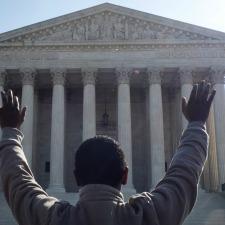BOB GARFIELD: If media coverage has influenced public opinion about the constitutionality of the individual mandate and Obamacare, as a whole, we’re still left to wonder if public opinion really, you know, matters when it comes to the Court. Dahlia Lithwick, who covers legal issues for Slate, says, public opinion does matter.
DAHLIA LITHWICK: If public opinion was strongly in favor of the Affordable Care Act, I don’t think this law would be in question right now, but because public opinion has been so muddled – polls even this week suggest that some people like some parts of the law but most people don’t like all of it – I think it might even embolden the Court to take that step of striking it down.
BOB GARFIELD: It’s been explained to me since I was about nine years old that the high courts, the Supremes, pay no attention to the push and pull of partisan politics; they march into the courtroom in their robes and rule based on their own deliberations and the sanctity of precedent.
DAHLIA LITHWICK: The Court is well aware of the fact that public approval of the Court is the only thing they have. They don’t have the purse. They don’t have the sword. The only power they have is the public’s belief in their integrity. That said, the justices would not be confirmed to these positions were they not extremely political animals. And so, you always have the justices toggling back and forth between their political ideology and the need to look as though that doesn’t matter to them.
That will keep Justice Anthony Kennedy awake between now and the end of June, when the ink is dry on the opinion. Kennedy is going to make a decision about whether this is going to be Bush v. Gore, Part 2 or pull the mandate, holding their nose all the way, and writing it in such a way that the government could never pass anything like this again, but not just smack this down because they don’t like it as a policy matter.
BOB GARFIELD: I have read so much from court watchers drawing inferences about the justices’ tendencies based on the questions they asked in oral arguments. Has history shown that we can divine anything from the questions to predict what their rulings will be?
DAHLIA LITHWICK: Because it was six hours of argument, because everyone in America was actually listening, I think it really jacked up the theatricality of it. The questions became somewhat more performative [LAUGHS] and a little bit less substantive, as a result.
I will say this: You can clearly tell from some justices’ questions where their heads are at. So, for instance, when Justice Antonin Scalia says, “What’s to stop the government from forcing me to eat broccoli,” you know where his head is at. [LAUGHS] But the questions are used for all sorts of things. Sometimes they’re used for the justices to talk to one another. Don’t forget, they haven’t discussed the case until oral arguments.
And, more importantly, they use the questions to try to lobby one another. So we saw lots of justices using their questions to try to peel off Anthony Kennedy and bring him over to the fold, lots of questions that were, “Can you please respond to Justice Kennedy’s stated concern?”
BOB GARFIELD: The government’s case got off to [LAUGHS] a very slow start on Tuesday.
[CLIP]:
GENERAL VERRILLI: Insurance has become the predominant means of paying for health care in this country. For most Americans, for more than 80 percent of Americans, the insurance system does provide effective access. [PAUSE] Excuse me.
[END CLIP]
BOB GARFIELD: That was Don Verrilli, the solicitor general. Kind of a rough start, no?
DAHLIA LITHWICK: It was not pretty, but I think it’s one of the reasons that the Court likes to say they’re not going to let television and audio out, because this is the kind of thing that then plays on an infinite loop and becomes an item for The Daily Show. It absolutely became the story and overmastered the constitutional story that was actually playing out.
BOB GARFIELD: Now, on CNN Jeffrey Toobin described this and other exchanges as just a, a train wreck for the Obama administration. Is it possible that that characterization, alone, will give the Court license to do what it otherwise wouldn’t, for the very reasons you cited in the beginning, to, to preserve its reputation with the American people?
DAHLIA LITHWICK: The question of whether that would be the basis for a judicial decision, I think not. This is a 2700-page bill, enacted properly by the Congress, signed into law by the President. I don’t think this rises or falls with the performance of the oral advocates. Don’t forget, in a case like this they are writing for the history books.
Really, it does seem to me and to most Court watchers, as though after three days of very, very, very partisan, and I even want to say sound-bite-ey and bumper sticker-ey arguing in there, the justices now go into conference and they say to themselves, okay, we acted out, everybody got it off their chest, but we are still the Supreme Court. Our job is to make a determination: Does this law fit inside the gold posts that we have set for congressional Commerce Clause power, or not? That’s the only question left.
BOB GARFIELD: Dahlia, as always, thank you so much.
DAHLIA LITHWICK: Oh, thank you very much for having me.
BOB GARFIELD: Dahlia Lithwick covers legal affairs for Slate.com.
BROOKE GLADSTONE: Coming up, the media morph the image of Trayvon Martin. And is National Geographic sullying itself?
BOB GARFIELD: This is On the Media.

